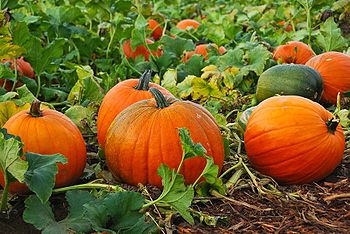Pumpkin
Other Names: Calabaza, Citrouille, Cucurbita galeottii, Cucurbita mammeata, Cucurbita pepo, Cucurbitea Peponis Semen, Cucumis pepo, Field Pumpkin, Graine de Citrouille, Huile de Graines de Citrouille, Pepo, Pumpkin Seed, Pumpkin Seed Oil.
Pumpkin isn't just for pie or jack-o-lanterns anymore. Full of vitamins, essential fatty acids, minerals and fiber -- this superfood should be consumed happily and often. The nutrients found in pumpkin prevent and alleviate conditions such as cancer, inflammation, kidney stones, depression, skin complaints and parasitic infections. Since autumn is the traditional time for pumpkin, the opportunity is ripe to take pleasure in all the bright, health-enhancing benefits of this humble vegetable.
See also :
Special Precautions of Pumpkin
Calabash (Lagenaria siceraria) is related to the pumpkin. But it's not a real pumpkin. The zucchini is indeed a pumpkin (Cucurbita pepo var. pepo). Pumpkins come in many shapes.
The benefits of Pumpkin are
Whether enjoyed in a pie, baked good, soup or simply straight-up, pumpkin is a delicious and nutrient rich addition to any diet. Check out the exceptional qualities of this familiar orange food:
- Vision protection : One of pumpkin's main benefits is visible right away, in its clever orange hue. As with sweet potato, carrots and butternut squash, this coloring occurs thanks to the presence of large amounts of carotene. As precursors to vitamin A, alpha-carotene and beta-carotene help to keep our eyes healthy and vision clear (especially in dim lighting) and guard against cataracts and degeneration. More than twice the daily recommended serving of vitamin A can be found in just one cup of cooked, mashed pumpkin. The carotenes, along with the many other antioxidants found in pumpkin, also help in the general maintenance of numerous other bodily functions - from strengthening the immune system, to the prevention of cancer, and cardiovascular disease.
- Skin care : When it comes to overall skin health, the properties of pumpkin are highly effective. It's a good source of vitamin C, which facilitates collagen production, increasing the elasticity of skin while also rendering it "aglow." It also reduces damage (wrinkles and other signs of premature aging) caused by free radicals, as might occur with sun damage or pollution. And pumpkin seeds, especially, contain plenty of beneficial zinc, which may help to regulate the hormones responsible for acne, as well as fatty acids, which support skin repair, increase moisture and improve flexibility.
- Detox and weight loss : Simultaneously low in calories (49 per cup) and high in fiber (three grams per cup), pumpkin is a holiday indulgence you can enjoy without the guilt. Diets rich in fiber have been shown to help people lose weight by causing them to feel fuller for longer. And with all that fiber ready and willing to help flush and eliminate toxins from your system, you'd do well not to incite additional blockages. So maybe abandon the traditional pie this year and make your own healthier version of pumpkin dessert. Be creative, avoid processed ingredients if you can, and experiment with alternative or raw ingredients instead. A little cinnamon, perhaps?
- Vitamin A - Alpha- and beta-carotene antioxidants are a class of carotenoids that convert into usable vitamin A within the body. Beta-carotene is anti-inflammatory and helps to reverse skin damage caused by the sun. Alpha-carotene hinders tumor growth, slows aging and protects against cataracts. Additionally, carotenoids reduce the risk of cardiovascular disease and boost immunity.
- Vitamin C - Vitamin C balances cholesterol levels, fights free radicals and encourages collagen production. It also fortifies the body against cancer and supports the immune system.
- Magnesium - Loaded with magnesium, both pumpkin seeds and pulp supply this important mineral. Required for healthy teeth and bones along with proper immune and heart function, magnesium plays a crucial role in the body.
- Vitamin E - As a key antioxidant, vitamin E contributes to healthy skin and offers protection against Alzheimer's disease along with certain types of cancer. Pumpkin seeds supply vitamin E in a range of forms including alpha-tocopherol, gamma-tocopherol, delta-tocopherol, alpha-tocomonoenol and gamma-tocomonoenol.
- Fiber - Pumpkin is an excellent source of fiber -- containing five grams per half-cup serving. Adequate fiber intake helps to protect against heart disease, assists in weight loss, supports healthy digestion and balances blood sugar levels.
- Pantothenic acid - Otherwise known as vitamin B5, this nutrient helps the body to manage stress and equalize hormones.
- Potassium and Zinc - Pumpkin flesh is potassium-rich and promotes heart health by calming hypertension. Zinc supports the immune and reproductive systems -- pumpkin seeds are a first-rate source.
- L-tryptophan - Abundant in this feel-good amino acid, pumpkin prevents depression and encourages a bright outlook.
- Pumpkin is also anti-parasitic and a natural diuretic. Additionally, kidney stones can be avoided by consuming five to ten grams of pumpkin seeds a day. And lets not forget about the high protein value of the seeds -- seven grams per ounce.
